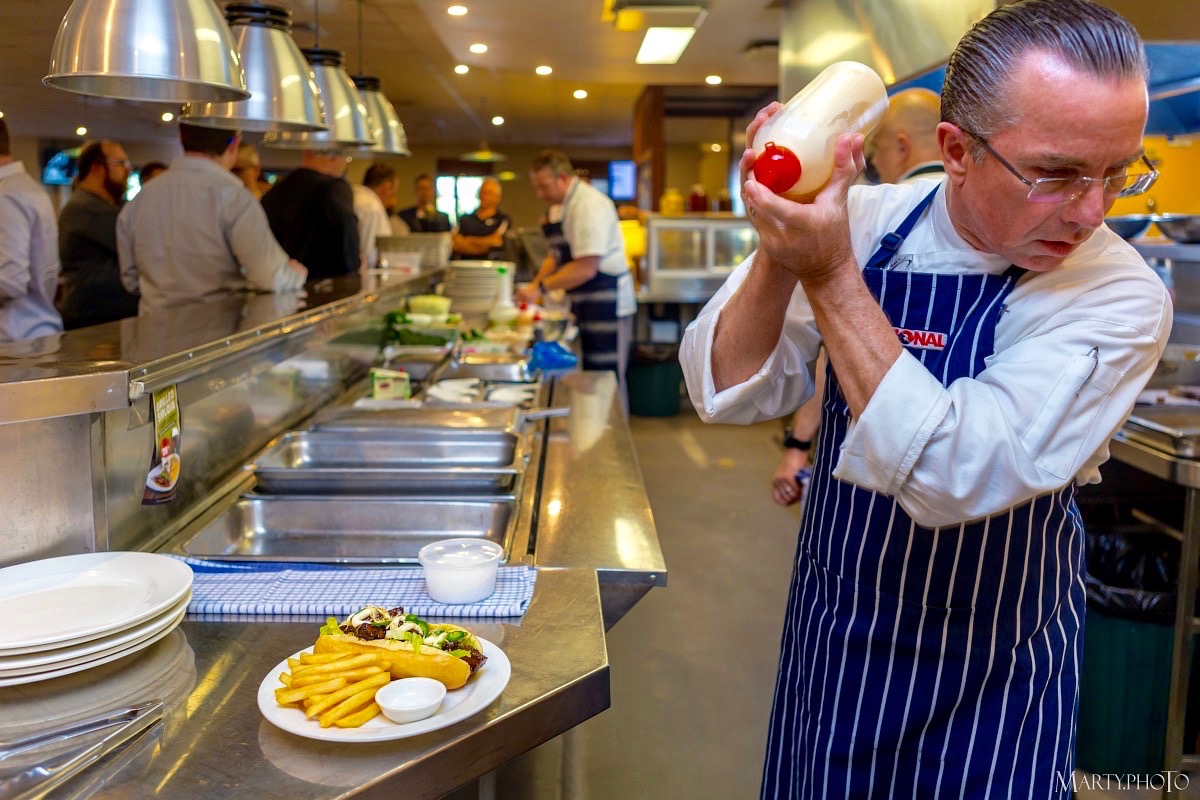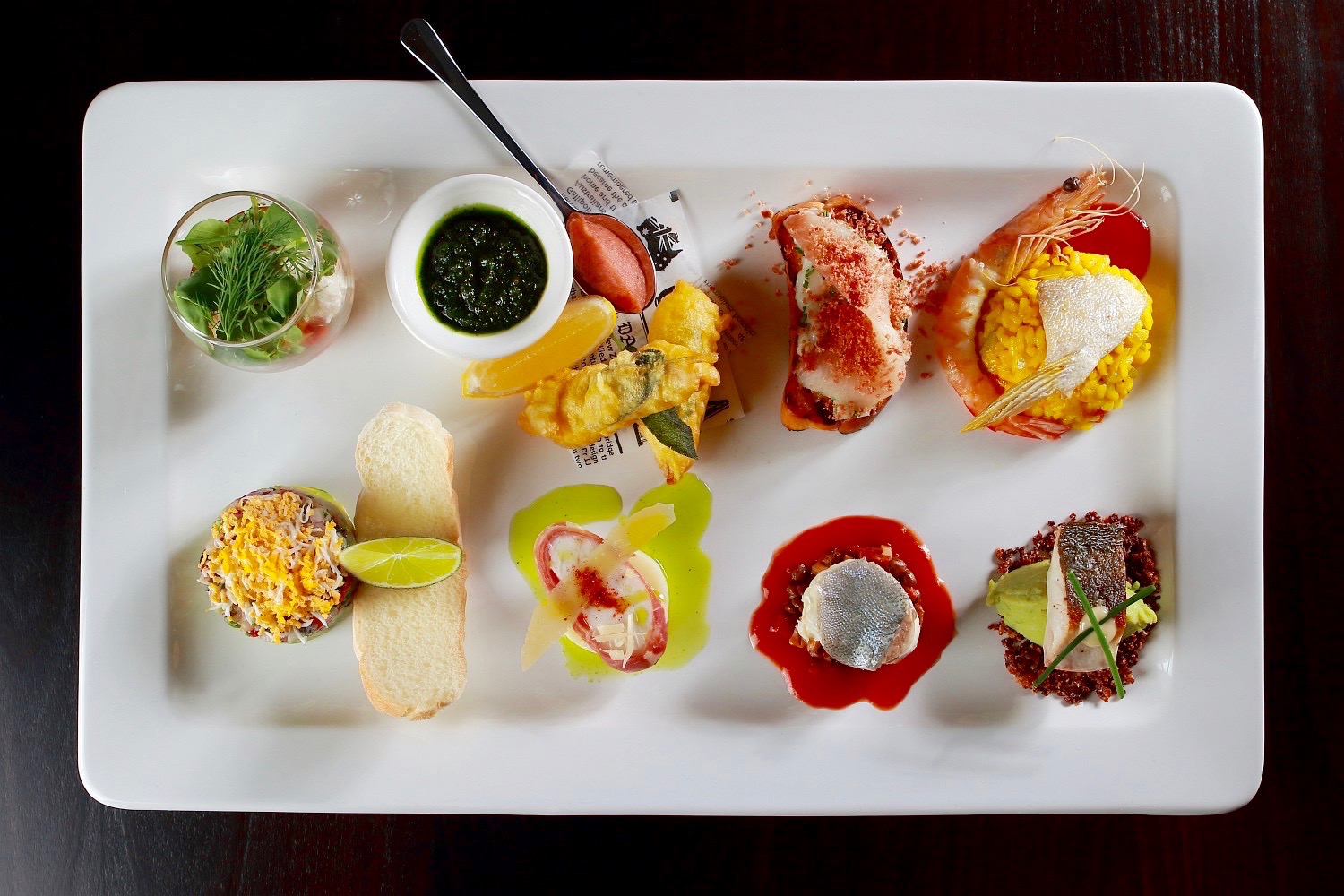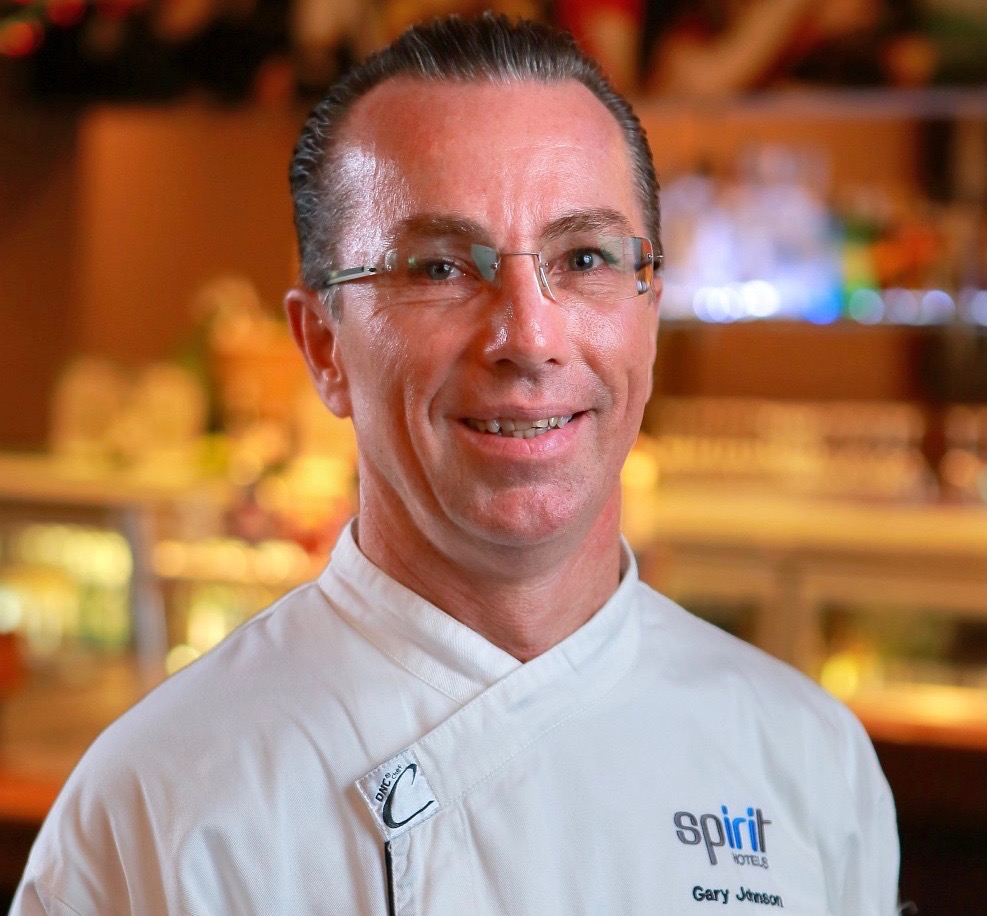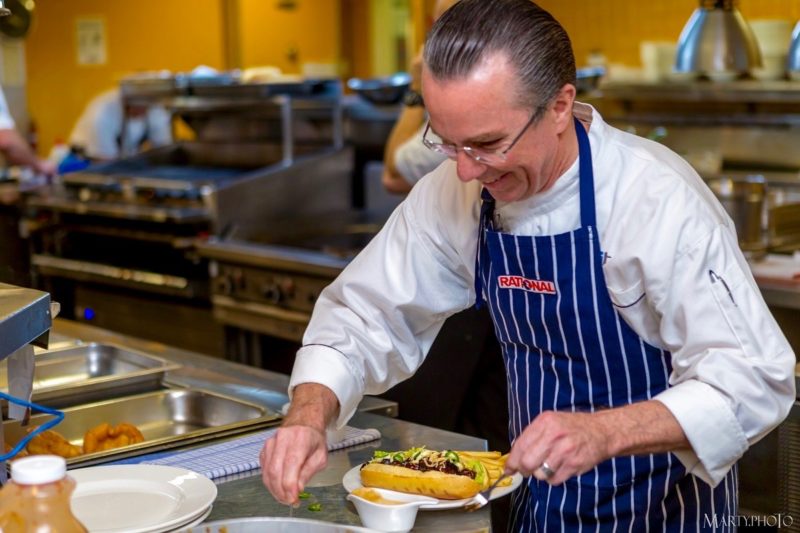“A kitchen is a fish tank – you need all species for that symbiotic if not ecological balance, there’s always guppies, fighting fish, a couple of snails, the diversity – you need to make exceptions for exceptional people.”
And so began our talk with a metaphor and a twist. Gary is not a celebrity chef, or our usual chef, or maybe he is. He’s a busy man now as ever, in his role as national food manager for Spirit Hotels, a huge conglomerate owned by Coles, or Westfarmers. He’s cooked for and hung out with celebrities, royalty, and has followed a curly path around the world cooking from a palace in Istanbul to Lizard Island.

Centre
From humble beginnings, Gary wears that humility as lightly as a raincoat that underneath hides a depth of knowledge and experience that is staggering. No wonder he was snapped up by Spirit, and stays there, happily, pushing the envelope, fostering the next generation, and maintaining an inclusive, happy work culture that is Gary to a ‘T’. He’s not keen on the term celebrity chef, or celebrity anything, really, because they’re all just people like you and me, aren’t they?
Enjoy his story, envy his work ethic, and marvel at the experiences he’s excavated all around the world. And then there’s Lee Marvin! In his words:
“My mother was one of 11 kids, and we used to have fantastic family parties. I was infatuated with the food. Everyone had their signature dish which they’d prepare at my Aunty Pat’s place. She lived on a huge property which had horses and paddocks with fruit, vegetable and herb gardens.
In my school holidays growing up I stayed with my grandparents in Stanthorpe where I learned to catch yabbies in the dams; shoot rabbits with my grandfather and bake bread with my grandmother. She cooked on a wood stove and I still remember the taste of her dishes – simple food that was always so tasty, and it’s never tasted as good since, no matter how hard I try. But before cooking, I studied Human Movement because I loved sport, but my real passion called so I left, then did an apprenticeship at the Crest Hotel in Brisbane.

Checking Sauce
I loved it and cooking, though I did nearly join the army! I worked at the Crest for 3.5 years without a holiday, I loved it that much – even with the long hours I never felt the need for a break. My dad said patience was good and you’ll never be penalized for working hard!! I never went by the clock, having that gift from him, ultimately gave me the rewards.
I remember the pastry chef I had there at the Crest was an angry old Dutch bastard, who gave the apprentices all the shitty jobs. I asked one day if I could learn to roll the croissants. He grunted. So I came in early, watched him and made him a cup of tea. One day, he showed me how to roll the bloody croissants – it was ‘keep knocking at the door’, sooner or later it happens. I stayed extra time in pastry and learnt so much, it’s incredibly useful in the entire spectrum of cooking. We did so much at the Crest and I look back, grateful for that start I had.
I worked on Hamilton Island, where Keith Williams introduced me to George Harrison, and he invited me for a drink. He was such a laid back, normal sort of guy, we’d sit around the piano while he played. It was magic. At Lizard Island, I used to drink whisky with Lee Marvin, who wore rugby shorts, blue singlets and no shoes, which he hated wearing so he used to come and drink with us in the staff quarters so he didn’t have to put shoes on! I did find that the biggest celebrities were the most normal and down to earth – they had nothing to prove, and I think yearned for a bit more of a normal life. We don’t know how lucky we are, really.

Tapas
I eventually took off, determined to work around the world and get more experience. I went to Europe, working for Anthony Worrel Thompson, Raymond Blanc and John Burton Race, starting at 7am, working until 11pm at night 6 days a week. Then my wife and I worked too hard! We were like ships in the night.
We worked around the world, and at the Four Seasons, in the Maldives, Prince Al Wahleed, was a VIP guest, who used to travel with an entourage of 24 people. He had newspapers from all over the world faxed to him daily. He always ran on Riyadh time. For food, he always ordered all dishes on the menu then would decide what he wanted to eat. He had 3 comedians and a jester who travelled with him to keep him happy. If he were poor, people would say he was mad, but with that much money he’s just eccentric! Or unique. I looked after him in London as well. His personal assistant met with us and gave us a book and power point presentation on how to look after the prince. Of course he had a food taster… Eventually, I moved on to the Kempinski Group (a German Group of hotels).
I’ve always enjoyed big teams – from what I’ve seen there are two types of chef, the ones who spend their time either in the big hotels or ones who stay in small, boutique outlets. I loved big. I worked at the Ciragan Palace in Istanbul where I had 155 chefs and 11 outlets within the hotel. We did banqueting for 2,500 people regularly. I had only 6 in my team who spoke English, so for the first 6 months, 2 days a week we learnt Turkish, which was a huge bonus! We ended up getting those beautiful carpets half price!
At the palace in Istanbul, one day I was in the gym which of course always had a few important people visiting, but this day I looked in the mirror and saw a guy in a suit, which was unusual, then another guy in a suit with an ear piece, I turned around, and Bill Clinton asked me how to start the running machine!! I remember telling Karen my wife, I was so excited! We chatted, he was really nice. and Paul Kelly came and ate at my restaurant; Hamed Kazai, leader of Afghanistan ate there, then Sting, I looked after him. And then I remember The Gypsy Kings, and I catered for Helmut Kohl’s daughter’s wedding. I should have kept a list! So many. Then, homesick, came back to work with the Hilton Group, in Cairns, then Sydney – I loved that. We had 76 chefs, and with 5 outlets, used to turn over $30 million in F & B a year – with a huge banqueting component.
Finally, I headed to Brisbane then started working for Coles – 6 years ago, and love it. No two days are the same. The hardest time was the first 12-18 months, it was like a runaway train. Our general manager understood that our reputation would be made in food, and the money made in drink and gambling “the other two sins!”
I look after all aspects of the food business in the hotels – the employment of all head chefs, menu templates, conceptual brand development, procurement (preferred products and suppliers) – it has a huge turnover in food sales with 89 hotels. Most are in Queensland, with the majority in south-east Queensland.

Gary
And boy, the industry’s changed in the years since I was a young apprentice. When I first started, it was predominantly male, with a lot of arguing and mess, then when I was running restaurants and huge kitchens with 30 or 40 chefs, I made sure I hired at least 50% female, and the fighting stopped, the kitchens got tidier, and everyone was happier! Funny that!
Why? I found the women more determined and tenacious, then in the end, more influential, because the guys would mirror their behavior – that cool, calm, and collected was much smarter than throwing all their toys out of the cot and having a hissy fit.
There were many times I worked too hard – especially in my own place which had 3 chefs’ hats. We worked 14 hours a day, 6 days a week, and to keep those hats we had to be there the whole time. We could never afford one slip up – the pressure was incredible, and never let up. I can honestly see why Michelin chefs now are giving their stars back – in the end, it’s just not worth it.
What’s missing for a lot of apprentices now is the mentor system. When they have that, they can get through most things – that mentor system gets more of them across the line. Our industry hasn’t changed enough, these days the work life balance for young people is more important than the money! And who can blame them? They must look up at so many chef burn outs and suicide and think, “Why? Why would I go through that?” I don’t think they all believe they can be a celebrity chef overnight. They’re smarter than that.
We need to focus more on mental health – when you’re mentally drained as well as emotionally, then you have nothing left for either family or yourself. And there’s a lot of disruption in the industry now – you’ve got to be a crack barista to have a successful café. The prices are being pushed to the edge and the staff suffer. To survive the competition, you have to be continuously at the edge – finding new ways, pushing the envelope. I am always connected to web sites and the coal face of the industry to stay on top.
And the training system needs to be fixed. My dad used to have a saying, “if you don’t know where you want to go, or what you want to do, just work hard. Sooner or later, doors will open.” He was so wise. With a Cert 3 now you can get it done in 2 years, which is just not enough time to learn all the skills of the trade.
If the kids aren’t trained to where they should be and get the sack because they haven’t mastered the skills, they’ve just been signed off for someone else’s benefit. It sucks, and isn’t fair. Why don’t we give the grants to the apprentices in a way that keeps them training longer, in a better system, and gives them a shot at a good job with good pay rates and conditions. What’s so damned hard about that? If other trades can do it, why can’t we?
What would I say to someone young just starting out now? Well, let’s work together for a better industry, and passion will be your greatest ally. Some days are diamonds, others are stones. You just need tenacity to stay the course.
Thank you Gary. It was a pleasure meeting and chatting with you. You are a shining beacon in an industry that needs a big shake up. Let’s do it!!
Chrissie 🙂




Hi Colin, Yes, very impressive. And doing great things as always. It was a pleasure to tell his story. Cheers
i worked with Gary in the mid eighties , a incredible chef and great guy.
Sure is Steve – he’s amazing!
Nice to read an article from a chef that understands the game and the level of complexity required to deliver excellent quality.
Thank you Peter – it’s so true, isn’t it? The industry needs to change from the inside out. I’d love to put a sock in the people who say, “it was good enough for me” or “suck it up, that’s a chef’s life” etc. ad nauseum. And the government is throwing money at departments trying to sell apprenticeships to kids who have absolutely no interest in 60-100 hour weeks. And why would they? They can make more money mowing lawns.
I’m working on a chef’s support site that gives chefs and staff tools to deal with stress, and hopefully, create a huge lobby group that gets the pay and conditions chefs deserve. It’s called Off the Hotplate, and if you are interested, just subscribe on justthesizzle or like and follow us on Facebook – would really appreciate just that.
Onwards and upwards!
A great article,Gary……..you are so right regarding training, apprentices are being let down by the system,the basics are missing, soups,stocks and sauces are all being bought in these days and their training suffers. When we were young we were had stocks on the go, sauces to be made, knife skills were essential, boning and tieing roasts, making puff pastry was a requirement and now it’s all bought in. I had a thought a few months ago, if Escoffier came back today he would probably say” all these mod cons that you have, combi ovens sous vide machines, blast chillers, stick blenders,robot coupes etc then why are you all still doing 60-70 hours a week”. Hope that you are well my friend take care, kind regards
Peter